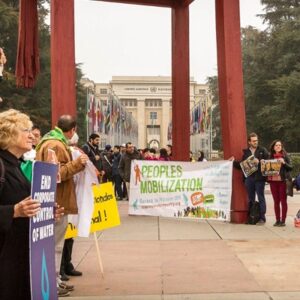Moisés Borges, leader of the Movement of People Affected by Dams [1] (MAB) stated that the Ecuadorian Chair of the Working Group that is negotiating at the United Nations a legally binding tool on transnational corporations and human rights is promoting a text that legitimises violations.
Borges, who is part of the national coordination of the MAB and is the coordinator of the movement in Bahia State, said in an interview with Real World Radio that the Chair of the negotiations is implementing an “authoritarian, incorrect and non-transparent methodology.” “And what surprises us the most is that this is not a business meeting, this is the UN Human Rights Council,” he stressed.
The eighth round of negotiations towards a Binding Treaty on transnational corporations and human rights [2] started on Monday in Geneva, and will come to an end on Friday. The goal of those promoting the Binding Treaty is to stop corporate impunity in light of the absence of international binding tools that establish obligations for companies and provide access to justice for affected communities.
On the first day of the negotiations, the social movements and organisations that are part of the Global Campaign to Dismantle Corporate Power [3] expressed their concern over the fact that the Ecuadorian Chair of the Working Group submitted a text of its own, disregarding the “third revised draft” which came up after the 2021 round of negotiations [4]. The civil society present in Room XX of the Palais des Nations, where the Working Group is holding its sessions, rejected the move of the Ecuadorian Chair.
“What the Chair calls an informal document is in fact a parallel document,” said Borges. “When you read the text it becomes quite clear that this is a position of the corporations. (…) It seems to us that the Chair is getting closer to the International Chamber of Commerce, to employers, so that this Treaty fails to comply with its role, which is to protect the human rights of affected communities,” added the activist.
For the MAB leader it is no coincidence that the US is participating in this round of negotiations, something that it had never done before. “Now there is a parallel document that defends corporate interests, which is why the US is here. The Chair (of the Working Group) cannot defend the document alone, so it needs someone to legitimise the document, and that is the job of the European Union and the US.”
Borges added that in fact only the European bloc, the US and a couple more states have contributed to the parallel document. All the other countries are working on the “third revised draft.” “This is the text that should be negotiated [5], it has some shortcomings, but also guarantees,” said the leader, because the third draft includes several of the points raised by the Global Campaign for the Binding Treaty [6].
The representative of the MAB lamented the process of corporate capture of this UN Working Group: “What we see is companies capturing the Treaty building process. This is something unbelievable and absurd.”
One of the arguments of the Global Campaign in defence of the Binding Treaty is that the UN Guiding Principles on corporations and human rights and the “due diligence” framework have been completely ineffective [7] in defending these rights, among other things because these principles are not mandatory. The Binding Treaty that is currently under negotiation is mandatory and it focuses on transnational corporations.
Borges explained: “Almost seven years have passed since the collapse of the Mariana [8] dam, and five years since Brumadinho [9], and what we see is that the progress in rights and the victories of the people affected were the result of the people´s own struggle.” “What we have today in terms of human rights laws is not enough,” he stressed. Borges also highlighted that the challenge now is to resume peoples´ mobilisations in the countries in order to push for the Binding Treaty.
